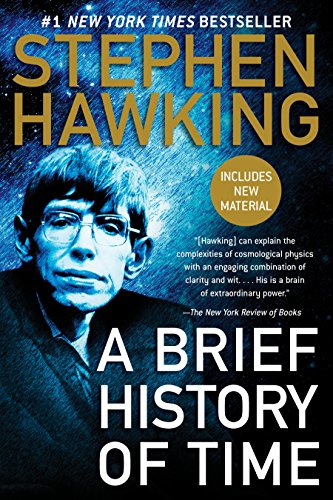A Brief History of Time by Stephen Hawking Link to heading
Summary Link to heading
“A Brief History of Time” is a groundbreaking work by physicist Stephen Hawking that seeks to explain complex concepts about the universe in a manner accessible to the general public. The book delves into fundamental questions about the nature of time, the cosmos, and our place within it. It covers a range of topics from the Big Bang and black holes to the nature of time and the search for a unified theory that integrates relativity and quantum mechanics. Hawking explores these topics with the aim of illuminating the intricacies of the universe and how modern physics attempts to understand its beginnings, structure, and ultimate fate.
Review Link to heading
Since its publication in 1988, “A Brief History of Time” has been celebrated for its ability to translate complex scientific theories into terms understood by laypeople, making it a staple of popular science literature. Stephen Hawking’s ability to weave physics with philosophy and humankind’s quest for knowledge has allowed the book to maintain its place as an influential read. While the book is praised for its clarity and engaging narrative style, some readers might find certain sections challenging due to the inherently complex topics discussed. Nonetheless, it remains a seminal work for its lucid exposition of sophisticated ideas.
Key Takeaways Link to heading
- The Nature of Time: Time is not constant and can fluctuate in different circumstances, especially under relativistic conditions.
- The Universe’s Beginnings and Ends: The universe has a definitive beginning, the Big Bang, and its eventual fate is still a subject of inquiry.
- Black Holes: These cosmic phenomena are not as black as once thought and may emit radiation, now known as Hawking radiation.
- Unified Theory: The goal of modern physics is to formulate a theory that unites the general theory of relativity with quantum mechanics, potentially providing a more comprehensive understanding of the universe.
Recommendation Link to heading
“A Brief History of Time” is highly recommended for anyone with a curiosity about the universe and the fundamental laws of nature. It is particularly beneficial for readers interested in physics, cosmology, and philosophy but who may not possess a formal scientific background. Students, educators, and science enthusiasts will find Hawking’s insights both enlightening and inspiring. Whether you’re exploring these ideas for the first time or returning to deepen your understanding, this book offers a profound journey into the fabric of the cosmos.
